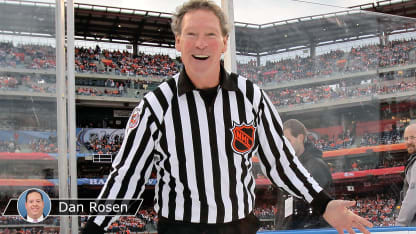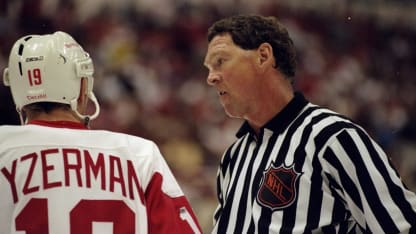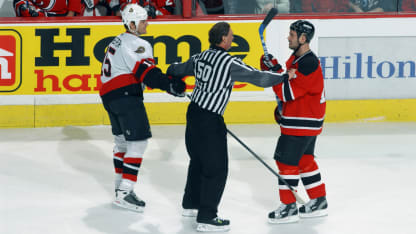A rink manager, a car, a fraternity brother in need of a ride and an undying desire to be on the ice all came together to give Kevin Collins the opportunity to land a gig as an official when he was a sophomore in college.
Nearly 40 years and 28 seasons as an NHL linesman later, Collins is about to become a hall of famer.
Collins officially thrilled by U.S. Hockey Hall of Fame nod
Longtime NHL linesman, teacher to be inducted on Dec. 13

Collins, 67, an NHL linesman from 1977-2005, will be inducted into the U.S. Hockey Hall of Fame on Wednesday. He'll join former Boston University coach Jack Parker, ex-NHL forward Scott Young, former NHL coach Ron Wilson and ex-U.S. women's Olympic team coach Ben Smith in the Class of 2017. The ceremony will be held in Boston, 90 miles from Collins' hometown of Springfield, Massachusetts.
"It's the pinnacle of my career, just the icing on the cake," Collins said of becoming a U.S. Hockey Hall of Famer. "It's overwhelmingly outstanding. I never expected it, and I wasn't looking for it. I just went to work every day and did my job and did it the best I could. That's all that matters. That was the way I was brought up."
Collins officiated more than 2,000 NHL games, including 296 Stanley Cup Playoff games, the most by a U.S.-born official.
He was on the ice for 32 Stanley Cup Final games, second among U.S.-born officials behind Bill Chadwick, who was inducted into the U.S. Hockey Hall of Fame in 1974. The biggest game Collins officiated was Game 7 of the 1994 Final between the New York Rangers and Vancouver Canucks at Madison Square Garden.
Collins said the impact of his on-ice work pales in comparison to the one he made helping young referees in the NHL and through the school he co-founded in 1974. The Western New England School of Officiating spawned the training program USA Hockey uses today for officials.
"Kevin was one of those guys that was so helpful to a young ref," said former NHL referee Don VanMassenhoven, who broke into the NHL in 1992. "He would give you tips. He would calm you down. He would help you in the intermissions by talking to you about things to watch. He just treated you like an equal. If you got a game with Kevin, it was exciting."
Collins has former college teammate and ex-NHL forward Dave Forbes to thank for helping him find his stripes.
Forbes played with Collins at American International College in Springfield and was his big brother in their fraternity. Since he was going to school in his hometown, Collins had access to his parents' car. Forbes didn't have a car, so he needed rides to games and practices.

© Elsa
"This one practice the local rink manager came in and said, 'Hey, we're starting an in-house weekend league for kids and we need refs,' " Collins said. "He figured college players would do it, but I wasn't even paying attention. I was just kind of getting undressed. Dave said, 'Hey, I'll do it.' Then he whacks me and says, 'Kevin will do it too.'
"I looked at him and I'm like, 'What are you talking about?' He says, 'Shut up, I'll tell you later.' Then he says, 'Matter of fact, when you schedule the games, just put Kevin and I together on all our assignments.' So I'm like, 'Seriously, what are you doing?' He says, 'You've got the car, you're my driver.'"
That was in 1970.
"Seven years later, I was calling Dave offside because he was playing for the Boston Bruins," Collins said.
Collins got serious about officiating after finishing a two-year minor-league playing career in 1974. He got a day job working toward becoming a probation officer and officiated games on nights and weekends. Collins didn't plan on it leading him to the NHL, but he got there by making an impression on people with influence.
"I was fortunate that the American Hockey League's home is in Springfield," Collins said. "They held their officiating camps, or linesmen camps, here and they always brought in NHL linesmen to run the program. I was very fortunate to have my idol, John D'Amico, and Matt Pavelich, two senior, top linesmen in the NHL, running the camps. John took a liking to me and he recommended after two years to Scotty Morrison, who was the NHL's referee-in-chief at the time, to hire me. I'm glad Scotty trusted John. That's how I got hired."
Collins became known throughout the NHL as the linesmen who refused to wear a helmet, yet didn't have any fear jumping into the middle of a fight to break it up.
"Hey, John D'Amico would jump into fights and just pull everyone away," Collins said. "I said, 'Well, if that's how you do it, that's the way I'm doing it.' "
Collins took his share of punches, including a left hook to his face from former Philadelphia Flyers forward Craig Berube in a game against the Rangers at the Spectrum on Feb. 21, 1991. Berube was trying to hit Lindy Ruff, a Rangers player at the time and currently an assistant on New York's coaching staff.

© Doug Pensinger/Getty Images
"I owe Kevin thanks for that," Ruff said, laughing. "He got nailed."
Collins found a way to laugh it off too.
"Paul Holmgren was coaching [the Flyers] at the time. All the players are up, it's in Philly, he's got his foot on the dasher and I go skating over with blood dripping down the side of my face. So, I go, 'Paul, if that's the toughest you guys have got, you guys are in big trouble.' They all started laughing," Collins said.
That was vintage Collins. He had a way of bringing levity to a tense situation.
"He communicated well," Columbus Blue Jackets coach John Tortorella said. "I think some of the younger guys now, they don't want to talk to you. I think you need to have a line of communication. It gets away from the hot spots in the game if you're constantly communicating. Kevin and the old-school guys, you'd have a few conversations. It could be [expletive] you, [expletive] you, but you have the conversations. You're talking. You're not boiling over. Kevin was really good at that."
Collins taught a lot of what he practiced too. He said his proudest accomplishment is co-founding the Western New England School of Officiating with friend Al Pinciak in 1974. It was at the time the only privately owned school for hockey officials in the United States.
Pinciak instructed in the classroom. Collins instructed on the ice.
Former NHL officials Pat Dapuzzo and Mark Faucette went through the school, as did current linesman Brian Murphy. Many AHL, junior hockey and collegiate referees did too. Collins and Pinciak stopped running the school in 1997.
"That I am deeply proud of, helping people with their careers," Collins said.
In 1983, USA Hockey used the school's curriculum to create its Officiating Summer Development Camp and write its officiating manual series. Each was developed by former NCAA and minor-league official Mark Rudolph, a two-time attendee at Collins' school.
Collins said when Rudolph came to the school for the second time he would sit in the back of the classroom every day, head buried in his notebook, scribbling down everything that was being taught. Collins thought it was odd at the time, until Rudolph finally told Collins what he was doing and asked for his assistance.
"That's one of the reasons I stopped the school and started running around the country doing stuff for USA Hockey," Collins said. "This thing grew to where now guys who have come through the program come back and are running satellite programs in their local areas at the lower levels. It's just been great for the USA Hockey officiating department."
Collins has stopped running around. He's home in Springfield, a grandfather to four; his oldest grandchild is 8. He found his passion and took it the distance. He broke up hundreds of fights, took some punches, was on the ice for huge moments in NHL history and assisted countless officials in reaching their pinnacle as well.
Now he has reached his.
"He was a Hall of Fame official, and he is a Hall of Fame person," VanMassenhoven said. "He was a legend, but he didn't act like one."

















